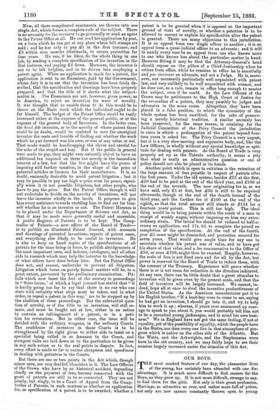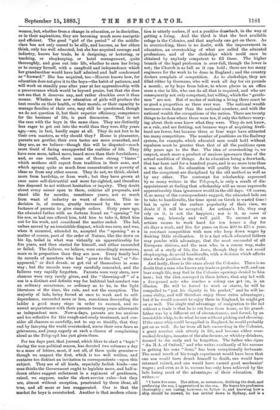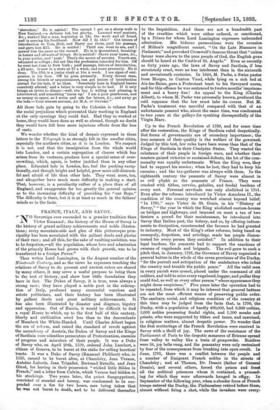OUR BOYS. r E most marked feature of our day, the
pleasanter lives of the young, has certainly been attended with one dis- advantage. It is much more difficult to find careers for the Boys, as they grow up. It is not more difficult, strange to say, to find them for the girls. Not only is their great profession, Marriage, as attractive as ever, and rather more full of prizes, not only are new careers constantly thrown open to young
women, but, whether from a change in education, or in discipline, or in their aspirations, they are becoming much more energetic and efficient. The good "girl of the period" of the middle- class has not only ceased to be silly, and become, as her elders think, only too well educated, but she has acquired courage and industry, knows her trade, be it designing, or lecturing, or teaching, or shopkeeping, or hotel management, quite thoroughly, and goes out into life, whether to earn her living or to occupy herself, with a sangfroid and independence which her grandmother would have half admired and half condemned as "forward." She has acquired, too—Heaven knows how, for education does not give it to the boys—the habit of patience, and will work on steadily year after year at her apprenticeship with a perseverance which would be beyond praise, but that she does not see that it deserves any, and rather chuckles over it than moans. Whether the new education of girls will produce the best results on their health, or their morals, or their capacity to manage families of their own, may still be questioned, though we do not question it, but their superior efficiency, competence for the business of life, is past discussion. That is not the case with the boys in the same class. They are distinctly less eager to get out into the world than they were fifty years ago,—are, in fact, hardly eager at all. They do not fret to be their own masters, as why should they P Home is pleasanter, parents are gentler, their own tastes are more consulted, and they are, as we believe—though this will be disputed—much more timid of facing unsupported the realities of life. They have seen more, talked more, heard more than their forefathers ; and, as one result, show none of those strong " biases " which mothers still expect from tradition in their sons, and which sprang quite as mach from concentration or poverty of ideas as from any other source. They do not, we think, shrink more from hardship, or from work; but they have grown at once more self-distrustful and more far-sighted, and therefore less disposed to act without hesitation or inquiry. They doubt about every career open to them, criticise all proposals, and stand idle for months, sometimes years, not so much from want of industry as want of decision. This in- decision is, of course, greatly increased by the new re- luctance of parents to give simple orders. Sixty years ago, the educated father with no fortune found an " opening " for his son, or had one offered him, told him to take it, fitted him out for his work, and considered the matter ended. The lad, unless moved by an irresistible disgust, which was rare, and was, when it occurred, attended to, accepted the " opening " as a matter of course, part of the order of Nature, like the down on his lip, toiled in what was virtually an apprenticeship for five years, and then started for himself, and either succeeded or failed. The failures, we believe, were exceedingly numerous, more so in proportion than they are now. Every family bad its records of members who had "gone to the bad," or "dis- appeared," or died. drunk, or got rid of themselves in some way ; but the records were very carefully concealed, and the failures very rapidly forgotten. Parents were very stern, new chances were very rarely given, and the " throwing-off " of a son in a distinct and definite way for habitual bad-conduct was an ordinary occurrence, so ordinary as to be, in the light literature of the time, the rule, and not the exception. The majority of lads, being forced at once to work and to self- dependence, succeeded more or less, sometimes descending the
ladder a good many steps in order to succeed, and re- newed acquaintance with their parents twenty years afterwards as independent men. Now-a-days, parents are too anxious and too reflective for this rough-and-ready treatment, and con- sider all chances so carefully, not to say so timidly, that they end by fancying the world overstocked, nurse their own fears as grievances, and jump eagerly at such a chance of complaining aloud as the Telegraph has just given them.
For ten days past, that journal, which likes to start a "topic" during the non-political season, has devoted two columns a day to a mass of letters, most, if not all, of them quite genuine— though we suspect the first, which is too well written, and contains too distinct an invitation to correspondents—upon this subject. They are of all kinds, especially foolish kinds—one man thinks the Government ought to legislate more, and half-a- dozen others suggest enlistment in a regiment of gentlemen, raised, we suppose, under the short-service rules—but they are, almost without exception, penetrated by three ideas, all true, and all more or less exaggerated. One is that the market for boys is overstocked. Another is that modern educa-
tion is utterly useless, if not a positive drawback, in the way of getting a living. And the third is that the best available refuge is the Colonies, and that anybody can get on there. As to overstocking, there is no doubt, with the improvement in education, an overstocking of what are called the educated professions, and of the clerkships which could once be obtained by anybody competent to fill them. The higher branch of the legal profession is over-full, though the lower is not; the Church is as full as it can hold ; there are too many engineers for the work to be done in England ; and the country doctors complain of competition. As to clerkships, they are filled either by Germans, who will work all day for six pounds a month; or by boys from below, to whom places in an office seem a rise in life, who can do all that is required, and who are consequently not only competent, but willing, which the "gentle- men " are not. But of modes of making a living there must be as good a proportion as there ever was. The national wealth increases even faster than the national numbers, and with the national wealth the occupations of the nation. There are twenty things to be done where there were ten, if only the fathers worry- ing about their sons knew what they were. They do not know, as a rule, and are fretting, not because ways of acquiring liveli- hood are fewer, but because three or four ways have attracted too many competitors. The number of positions on the Railway system, for example, which educated men could hold without repulsion must be greater than that of all the positions open fifty years ago to the Bar. The idea of overstocking is, we suspect, much more a product of anxious ignorance than of the actual condition of things. As to education being a drawback, that has been said for a hundred years, and is no more true than it was at first. No education will qualify the incompetent, and the competent are disciplined by the old method as well as by any other. The contempt for scholarship expressed by so many writers in the Telegraph, is only a result of dis- appointment at finding that scholarship will no more supersede apprenticeship than ignorance would in the old days. Of course, if, as many of the correspondents suggest, the educated lads are to take to handicrafts, the time spent on Greek is wasted time ; but in spite of the surface popularity of their view, we doubt if it will be accepted. An artisan's life, they may rely on it, is not the happiest; nor is it, as some of them say, leisurely and well paid. To succeed as an artisan means to work hard for ten hours a day for six days a week, and live for years on from £60 to £75 a year,. in constant competition with men who keep down wages by desiring little civilisation. It is a fact which educated fathers may ponder with advantage, that the most successful of all European strivers, and the men who, in a coarse way, make most of a study of life, the Jews, though they do not avoid shopkeeping, do avoid handicrafts, with a decision which affects their whole position in the world.
And lastly, there is the craze about the Colonies. There is no doubt that a man who knows any trade or profession well, and can bear rough life, may find in the Colonies openings denied to him here ; but the idea conveyed in these letters, that any lad with a five-pound note who reaches a colony can get on, is an illusion. He will be forced to work or starve, he will be compelled to "put his dignity in his pocket," and he
be- come shifty, and will therefore enjoy those extra advantages ;
but if he would consent to enjoy them in England, he might get on as well. The single real advantage of emigration to the lad without a trade is that he is cut loose from home, as his grand- father was by a different set of circumstances, and forced, by an
irresistible whip, to do what he can without picking and choosing. If the same whip could be applied in Englaud, he would probably
get on as well. So far from all lads succeeding in the Colonies, a great number sink utterly in life, and become either over- worked drudges, inmates of the almshouses, or whiskey-drinkers, doomed to die early and be forgotten. The father who signs "An M.A. of Oxford," and who writes exultantly of his success in getting his sons "done," has been exceptionally fortunate. The usual result of his rough experiment would have been that one son would have drunk himself to death, one would have returned ruined, and one would have earned good mechanics'
wages ; and even as it is, success has only been achieved by the lads losing most of the advantages of their education. He writes:- " I have Svc sons. The eldest, at seventeen, disliking the desk, and preferring the sea, I apprenticed to the sea. Re learnt his profession thoroughly ' • not caring, however, to follow it, and knowing how a ship should be stowed, he has settled down in Sydney, and is a 'stevedore.' He is settled ! The second I got on a sheep walk in New Zealand,—a delicate lad, bat plucky. Learned wool matters, &o.; worked like a man, beginning at 15s. the week and all found, and is earning his livelihood. How did I do this P Got letters of introduction to Tom, Dick, and Harry out there, paid his passage,
and gave him £15. He is settled Third son went to sea, and I served him the same as the second. He is in Queensland, breaking- in horses and all sorts of things. He is settled ! Shove your name, &c., in your pocket, and push.' That's the secret of success. Fourth son, educated at college ; did not like the profession intended for him. Off he went last June to New York ; paid passage, letters of introduction, a £5 note. Is now in a store at $5 a week, and more presently. He is done. The fifth is a junior clerk at 10s. a week. I see signs of emi- gration in his face. Off be goes presently. Every decent man, among his friends or acquaintances, can get letters of introduction
abroad for his lads, if he likes. Somebody here in England knows somebody abroad,' and a letter is very simple to be had. If it only brings an invite to dinner—well, the boy is willing and pleasing, is interviewed, and something turns up.' I am a poor gentleman, and no money to spare, so I write and ask for letters, &c., and away go the lads.—Your sincere servant, AS M.A. or OXFORD."
All those lads gain by going to the Colonies is release from the social prejudices which prevented their working in England at the only openings they could find. Had they so worked at home, they would have done as well as abroad, though no doubt they would have felt here more injurious effects from the loss of caste.
We wonder whether the kind of despair expressed in these letters to the Telegraph, is as strongly felt in the smaller cities, especially the northern cities, as it is in London. We suspect it is not, and that the immigration from the whole world into London, and a certain segregation of classes which has arisen from its vastness, produce here a special sense of over- crowding, which, again, is better justified than in any other place. Educated lads in London, too, feel the pushing excep- tionally, and though bright and helpful, grow more self-distrust- ful and afraid of life than other lads. They want more, too, and altogether have mach more difficulty in making a start. That, however, is a peculiarity rather of a place than of all England, and exaggerates far too greatly the general opinion as to the increasing difficulty of providing for "our Boys." The difficulty is there, but it is at least as much in the fathers' minds as in the facts.




































 Previous page
Previous page